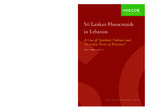Sri Lankan Housemaids in Lebanon
A Case of 'Symbolic Violence' and 'Everyday Forms of Resistance'
Abstract
Unraveled in this book are the real dynamics at stake in the Madame/housemaid relationship. While cases of extreme physical abuse by the Lebanese women who hire housemaids - Madames - are an exception, what has become normalised are more insidious patterns of domination used to control each and every aspect of their employees' lives. For their part, Sri Lankan housemaids are not merely passive victims. Away from direct provocation and first-hand repercussions, they try to deflect what Pierre Bourdieu has called 'symbolic violence'. These attempts at 'everyday forms of resistance', as defined by James Scott, can help loosen their employers' grip. Yet, as this unprecedented study shows, the Madame/housemaid relationship and the rules that govern it remain under the managerial hold of the Madame. Veel Sri Lankese vrouwen werken in Libanon als werkster bij Libanese gezinnen. Vaak worden deze werksters mishandeld door hun werkgeefsters. Voor het eerst brengt Nayla Moukarbel dit onderwerp aan het licht en toont aan dat fysiek geweld niet zo vaak voor komt als de Libanese media suggeren. Tegenwoordig wordt eerder een indirecte vorm van mentaal of zogenaamd 'symbolisch' geweld toegepast. De werkster wordt hierbij gedwongen zich volledig aan te passen aan de eigen en wensen van de zogenaamde 'madame'. Moukarbel laat zien dat werksters op een net zo indirecte manier verzet bieden tegen deze dominantie.
Keywords
public administration; sociology; bestuurskunde; sociologieDOI
10.5117/9789089640512ISBN
9789089640512OCN
317872520Publisher
Amsterdam University PressPublisher website
https://www.aup.nl/Publication date and place
2009Series
IMISCoe Dissertations,Classification
Sociology and anthropology
Politics and government


 Download
Download